Puppy breath is a popular phenomenon among new dog parents, but as your Dachshund ages stinky breath isn’t always a good thing.
Bad breath in any dog can mean something as minor as dirty teeth, or it could be serious as periodontal disease.
If you’ve found yourself reading this article, you might be asking yourself “why does my Dachshund have bad breath?” We have answers for you!
The reason your Dachshund has bad breath could be simple or it could be a sign of something more serious.
In this article we discuss what causes bad breath in Dachshunds and how you can potentially treat it.
We offer dental care options as well as product recommendations so you can get your furry friend’s teeth clean and breath smelling pleasant again.
What Causes Bad Breath in Dachshunds?
There are several different reasons why your Dachshund may have bad breath.
Most of the factors are general ones that can affect all dogs, but there are some Dachshund-specific causes to consider.
All dogs can have bad breath, but there are specific reasons Dachshunds may have it.
Potential causes of bad breath in Dachshunds include:
Dental disease
Did you know that 80% of dogs suffer from some form of periodontal disease by the time they are three years old?
Dental disease is the #1 cause of bad breath in any dog breed.
Luckily dental disease is easily avoidable through routine teeth brushing, dental chews, a quality diet, and regular teeth cleaning by a professional.
Dirty teeth
Dirty teeth can cause bad breath and dental disease.
Keeping your Dachshund’s teeth clean by brushing regularly, and using dental products such as water additives or teeth cleaning gels, can keep their breath smelling delightful!
Having a good oral health routine can help keep your dog’s mouth healthy and keep their breath smelling sweet.
Tooth abscesses
Dachshunds are prone to having abscesses, partially due to having a large amount of teeth (42 total) in a tiny mouth. When the teeth are crowded, they can press together trapping food or develop small scrapes in the surface.
This sort of dental issue can cause bad breath for your pup.
If you notice that your Dachshund’s breath suddenly becomes stinkier than usual, a vet visit may be in order to ensure there are no infections in your dog’s teeth or gums.
Diet
If your Dachshund is on a low-quality diet, or they only eat wet food, they may be more likely to develop stinky breath.
Feeding a high quality food with plenty of fiber, texture, and vitamins and nutrients will substantially help prevent bad breath.
Gingivitis
Gingivitis is the inflammation of your dog’s gums due to plaque buildup and trapped bacteria and food. It’s an indicator of early periodontal disease.
Gingivitis is common in dogs, and highly treatable.
Staying on top of gingivitis is key to prevent their health from getting worse.
Unfortunately it can lead to tooth loss if not treated in a timely manner.
Chews or toys
Cheap rubber or plastic chew toys, as well as stinky bully sticks or rawhide chews, can be the catalyst behind your Dachshund’s bad breath.
Some hard toys and chews can cause teeth to break and gums to bleed, which can make your dog’s teeth and gums vulnerable to infection.
Not all hard toys and chews are bad but it’s important to know what you’re offering your dog before you allow them to chew it and always supervise them.
Is the Dachshund Breed More Prone to Bad Breath?
Dachshunds are slightly more prone to bad breath than other dog breeds.
There are several reasons for this.
Having small mouths and extra buildup of tartar can make Dachshunds more prone to bad breath.
The breed is more likely to battle excessive tartar buildup and gum disease, which in turn causes bad breath.
Besides the genetic tooth-crowding issue mentioned above, the Dachshund breed is known for sometimes retaining their baby teeth longer than they should. When these baby teeth don’t fall out on their own, they can push against the teeth growing in.
In both of these scenarios, can result in food getting trapped between teeth or damage to the new teeth. This can increase the likelihood of dental issues and stinky breath.
When to See a Veterinarian About Your Dachshund’s Bad Breath
If you’ve tried brushing your Dachshund’s teeth consistently, and you’ve attempted to use dental chews, sprays or water additives with no improvement, it may be time to seek veterinary advice.
There may be a serious issue at hand that needs to be addressed right away.
A smart tip is to take your Dachshund in on a regular basis for a teeth cleaning.
You should also see your vet for regular “teeth maintenance” even if you don’t suspect something is wrong with their teeth.
The general rule of thumb is to begin annual professional teeth cleanings for your dog when they are around 7 years old, unless your veterinarian recommends you have it done before that.
Although veterinarian teeth cleaning does typically require anesthesia, some vets do offer anesthesia-free cleanings.
This service is especially helpful for nervous pet parents and senior dogs or pups with health issues that prevent them from being able to undergo anesthesia.
Either way, it’s time to see your veterinarian if your Dachshund’s breath is pungent and unbearable.
What Can Do at Home About Your Dachshund’s Bad Breath?
If your Dachshund has bad breath but it’s not enough for you to turn your head away, it’s a good idea to try an at-home remedy first.
It’s easy and cost-effective to purchase dental care products, even if you need to test out several options. If daily dental chews aren’t working, try a water additive, and so on and so forth.
Try to maintain your dog’s oral health at home on a daily basis.
Note: some of the links below are affiliate links, which means that we receive a small commission if you make a purchase.
You can take care of your dog’s teeth and bad breath at home with a variety of different techniques.
These include:
- Brushing your Dachshund’s teeth with a toothbrush and canine toothpaste. You can even buy finger brushes (including microfiber finger brushes) instead of using a traditional style brush.
- Using a product, like Plaque Off, to soften the plaque on your dog’s teeth. That way it will scrape off more easily when your dog is chewing something hard.
- Offering daily teeth-cleaning dental chews (just watch the calories). You might even want to put enzymatic dog toothpaste on the end of the chew to make it even more effective.
- Putting a tasteless dental water additive in your dog’s bowl. These water additives freshen breath, reduce plaque and tartar, and clean gums.
- Purchase a dental care brushing chew toy, which massages a dog’s teeth and gums at their leisure.
- Bake homemade dog treats with breath-freshening ingredients, or purchase brand name dental treats.
Let’s be honest – although brushing your dog’s teeth regularly is highly recommended by professionals, it’s not always possible.
Using dental chews, treats and water additives can considerably contribute to your Dachshund’s oral health in that case.
If your find a product and routine that works for you and your dog, stick with it! Using some sort of teeth cleaning technique is better than none at all.
However, don’t be afraid to seek veterinary care if you suspect your Dachshund is in pain or may have a tooth abscess. The sooner you get the problem under control, the better.
Remember that preventative dental care is always cheaper than professional treatment.
Bad breath in Dachshunds is mostly avoidable and treatable if you are proactive and establish some kind of tooth cleaning routine.
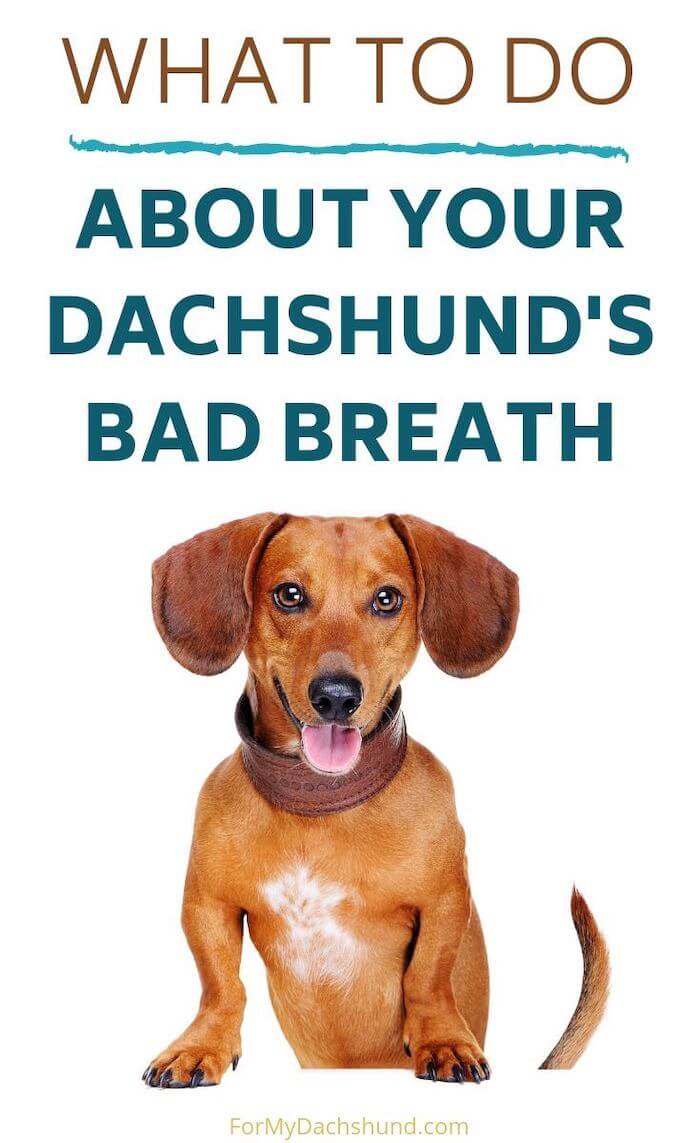
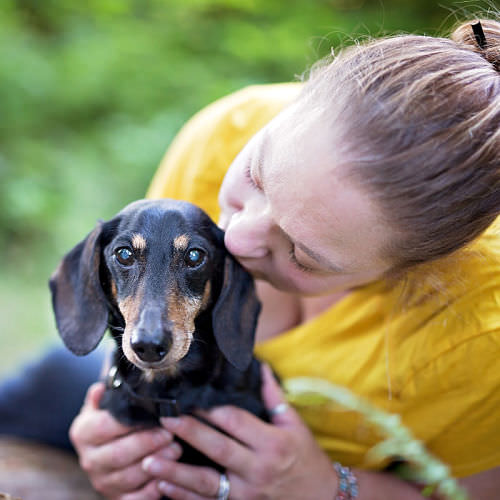
About the Author: Through her 17 years of owning and caring for Dachshunds, and almost 10 years researching and writing about them, JW has become a respected expert in the Dachshund community. Read more about her here.

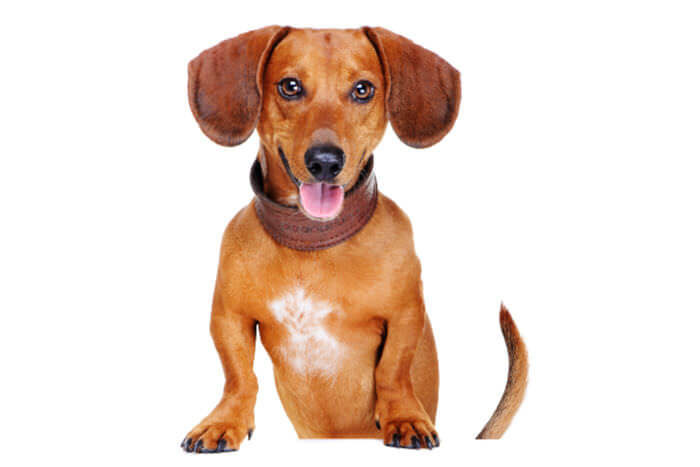
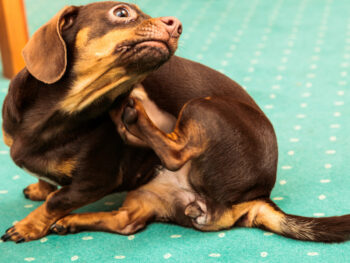
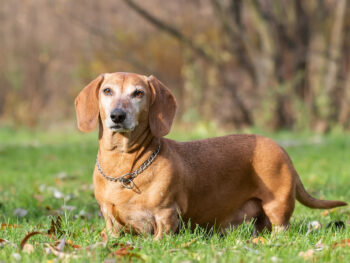
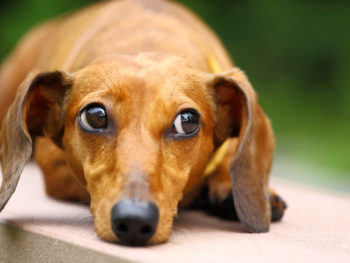
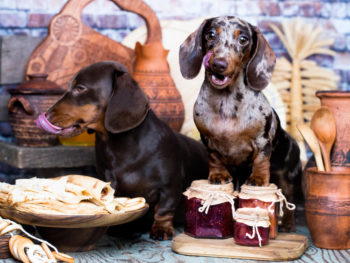
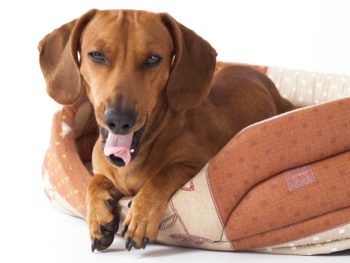
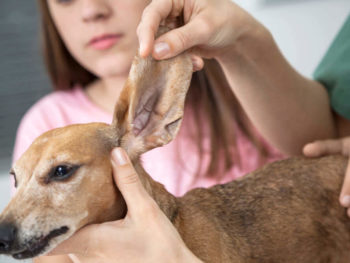
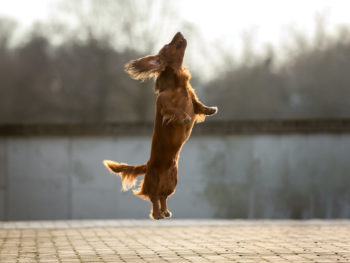
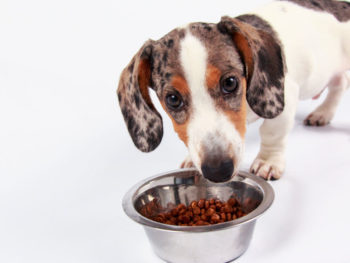
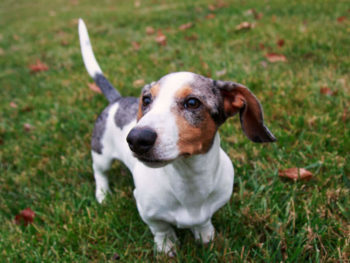
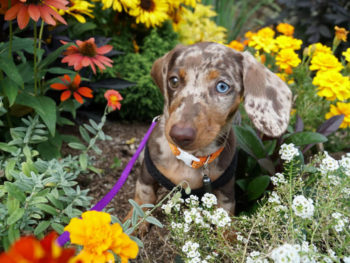

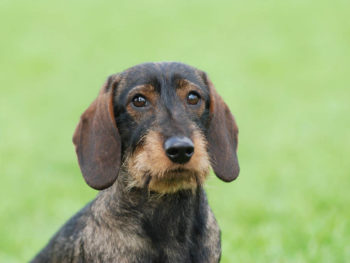
 Are Miniature Dachshunds Good Apartment Dogs?
Are Miniature Dachshunds Good Apartment Dogs?


